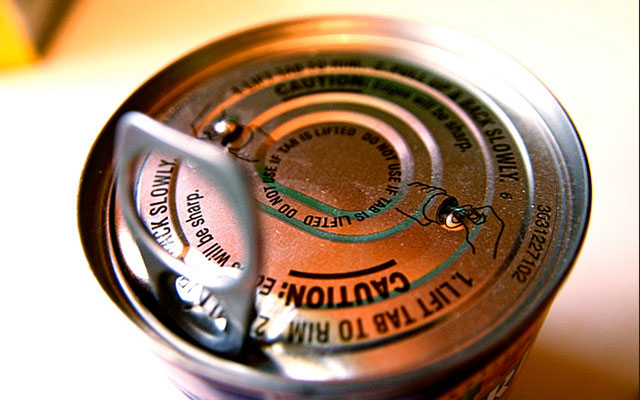Citing consumer health concerns, ConAgra last week became the latest food giant to announce it would stop packing its products in cans coated with bisphenol-A (BPA). The Omaha-based multinational joins Campbell Soup Company, General Mills, and other industry leaders that in recent months have begun phasing out the use of the controversial chemical in favor of ostensibly nontoxic alternatives.
“We recognize consumer interest in removing BPA from our cans and are pleased to be able to respond to that desire and offer food that our consumers can feel confident in,” said Gail Tavill, ConAgra’s head of packaging, in a statement released by the company.
BPA has long been used in canned goods to prevent botulism and ensure a longer shelf life, despite volumes of studies linking the chemical to developmental and reproductive health issues. Government efforts to regulate the use of the chemical have been largely ineffective, so the voluntary measures taken by ConAgra and others have been welcomed by environmental health advocates — with a caveat.
“We do want to push companies away from it, because it is a known toxin,” Renée Sharp, director of research for the Environmental Working Group, told Rachel Abrams in the New York Times. “At the same time, we are also definitely worried about the chemicals coming on the market, and we don’t have a lot of good information about a number of them.”
One of the options that companies may be employing (none has disclosed specific BPA alternatives), bisphenol S, or BPS, has already attracted the attention of at least one researcher. A recent study out of the University of Cincinnati suggested that exposure to BPS may affect humans in ways that are similar to the effects of BPA.
The study’s coauthor, Hong-Sheng Wang, an associate professor in the university’s pharmacology department, told Abrams that consumers should be wary of BPA replacements. “This is a good case study showing that the fact that something is BPA-free does not necessarily mean that it’s safe,” Wang said. “Those alternatives, their biological effect and the potential adverse effect need to be evaluated.”
While you’re waiting for additional research on BPA’s mysterious alternatives, be aware that the chemical remains ubiquitous in our environment. The good news is that there are steps you can take to lower your exposure. For some simple tips, see “BPA Detox” in our September 2014 issue.
Image credit: Steven Depolo, used under Creative Commons license.


This Post Has 0 Comments